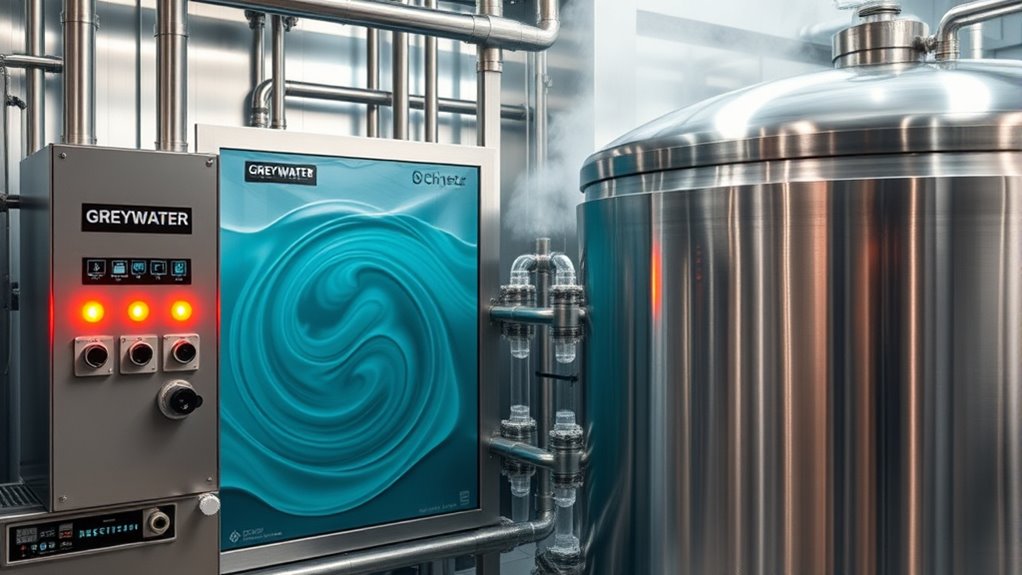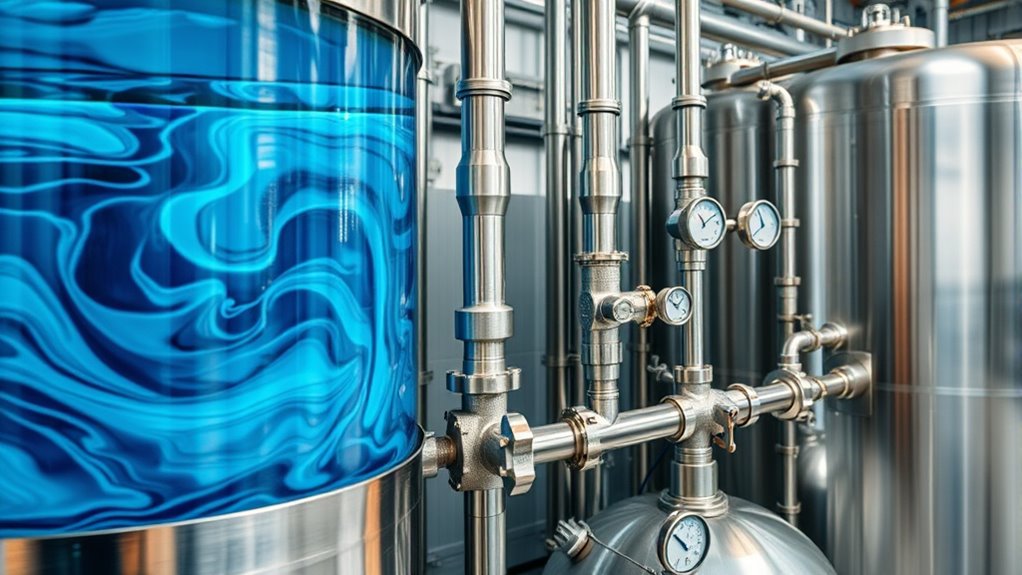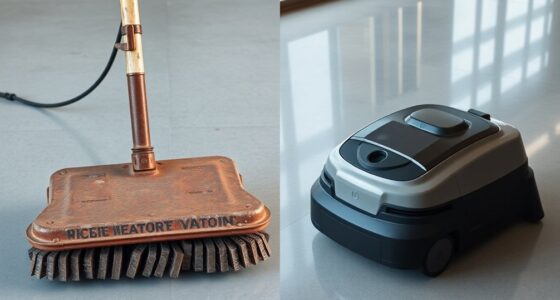Implementing water recycling and greywater systems in scrubbers can markedly improve industrial efficiency by reducing freshwater use and minimizing wastewater discharge. You can treat wastewater or greywater for reuse in scrubber operations, lowering operational costs and supporting sustainability goals. Proper systems filter, disinfect, and manage water flow to guarantee safety and compliance. By integrating these solutions, you not only conserve resources but also enhance environmental responsibility—exploring further reveals how to optimize these systems effectively.
Key Takeaways
- Greywater systems in scrubbers can reuse wastewater for non-potable applications, reducing overall water consumption.
- Incorporating filtration and biological treatments ensures safe reuse of greywater within scrubber operations.
- Customizable greywater solutions can be integrated into scrubber plumbing to optimize water efficiency.
- Proper maintenance and adherence to regulations are essential for safe and effective greywater system implementation in scrubbers.
- Greywater recycling in scrubbers supports sustainable practices by minimizing wastewater discharge and conserving resources.

Water recycling and greywater systems offer practical solutions to reduce water consumption and promote sustainability in your home. When you implement greywater treatment and water reuse strategies, you can considerably cut down on the amount of fresh water you use daily. These systems recycle water from sources like showers, sinks, and laundry to irrigate gardens or flush toilets, helping you conserve valuable resources. By adopting these strategies, you not only lower your utility bills but also lessen the strain on local water supplies, making your household more environmentally friendly.
Implement greywater reuse to save water and support sustainable living at home
Incorporating greywater treatment into your home’s plumbing system involves filtering and cleaning wastewater so it’s safe for reuse. This process typically includes removing solids, reducing contaminants, and ensuring the water meets safety standards for its intended use. You might choose a simple system that directs greywater directly to your garden or install more advanced treatment units that disinfect and recycle water for multiple purposes. Proper greywater management reduces dependency on municipal water sources and minimizes wastewater discharge, aligning your household with sustainable water practices.
Water reuse strategies can be tailored to fit your household’s specific needs. For instance, you could set up a system that captures greywater from your bathroom sinks and laundry, directing it to underground irrigation zones. This not only conserves potable water but also provides plants with nutrient-rich water that promotes healthy growth. If you’re interested in more extensive solutions, integrating greywater treatment units with your existing plumbing can enable safe reuse for toilet flushing, reducing your freshwater intake even further. These strategies require careful planning and adherence to local regulations, but they offer long-term benefits for both your home and the environment.
Greywater treatment systems are designed to be low-maintenance and efficient, often featuring simple filtration units, UV sterilizers, or biological treatment components. They operate quietly and seamlessly, integrating into your household plumbing without disrupting daily routines. With proper installation, you can confidently reuse greywater without concerns about health risks or regulatory compliance. As you explore water reuse strategies, remember that the goal is to maximize resource efficiency while safeguarding health and safety. Small adjustments, like directing greywater to specific landscape areas, can make a big difference in reducing your overall water footprint. Additionally, understanding the best juice cleanses for weight loss can inspire healthier lifestyle choices that complement your water conservation efforts.
Frequently Asked Questions
What Are the Maintenance Requirements for Greywater Systems?
You need to regularly inspect your greywater system to guarantee system durability. Check filtration methods like screens or filters for clogs and clean or replace them as needed. Keep an eye on pump performance and clear any debris to prevent blockages. Routine maintenance also involves monitoring water quality and addressing odors promptly. Proper upkeep ensures your greywater system functions efficiently and lasts longer, saving you time and money in the long run.
How Cost-Effective Are Water Recycling Systems Over Time?
Water recycling systems are quite cost-effective over time because they lead to significant cost savings on water bills and reduce reliance on freshwater sources. As a long-term investment, you’ll notice lower operational costs and improved sustainability. Although initial setup may be higher, the ongoing savings and environmental benefits make these systems a smart choice for your business or facility, ultimately paying off in the long run.
Are Greywater Systems Suitable for Residential or Industrial Use?
Did you know that greywater systems can save up to 40% of household water use? These systems are suitable for both residential and industrial applications, especially for indoor irrigation and commercial purposes. You can efficiently reuse greywater to reduce your water bills and environmental impact. Whether you’re managing a home or a large facility, greywater systems offer a practical, sustainable solution for conserving water and supporting eco-friendly practices.
What Regulations Govern Greywater Reuse in Different Regions?
You need to follow regional standards and legal requirements for greywater reuse. Regulations vary by region, so check local laws to guarantee compliance. Some areas have strict rules on water treatment and reuse, especially for residential use, while others may have looser standards. Always verify regional standards before implementing greywater systems, and consult with authorities or specialists to stay within legal compliance and avoid penalties.
How Can Water Quality Be Ensured in Recycled Greywater?
You can guarantee water quality in recycled greywater by regularly performing water testing to detect contaminants. Implement effective filtration methods, like sand or activated carbon filters, to remove impurities before reuse. Maintain proper system operation and cleaning routines to prevent bacterial growth. By combining routine testing with reliable filtration, you’ll minimize health risks and keep greywater safe for its intended reuse, complying with relevant regulations and standards.
Conclusion
By implementing water recycling and greywater systems in scrubbers, you can markedly reduce water consumption and environmental impact. Imagine a manufacturing plant that recycles greywater for its scrubber systems, cutting water use by 40%. Not only does this save costs, but it also helps protect local water sources. Embracing these systems makes your operation more sustainable and responsible, proving that small changes can lead to big environmental benefits. Start exploring these innovative solutions today!









